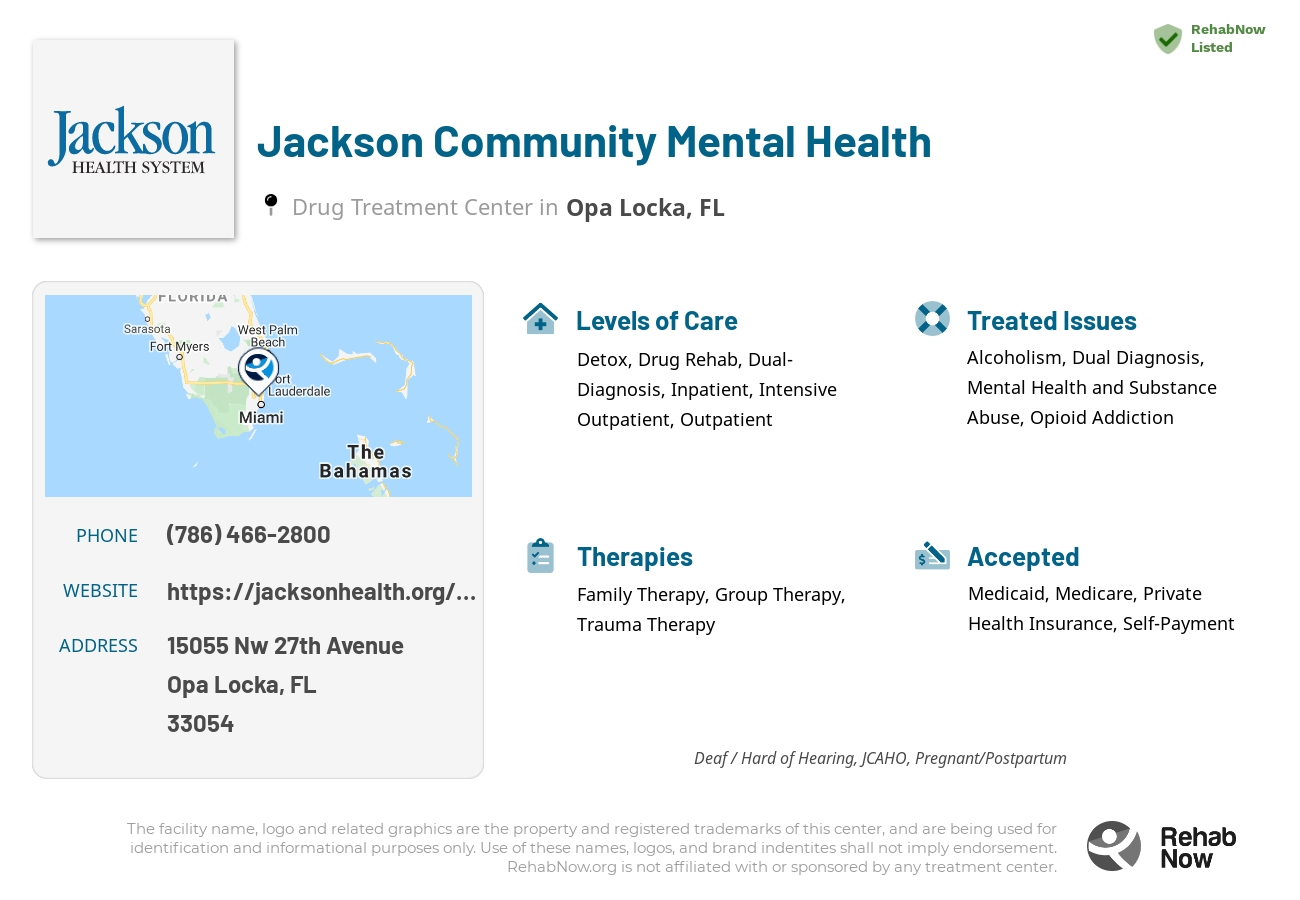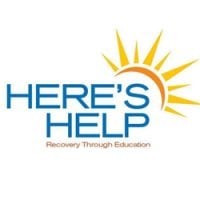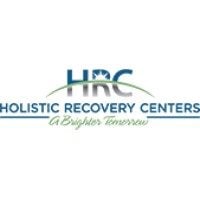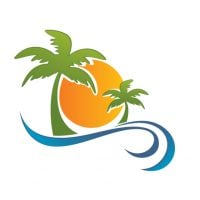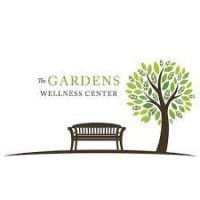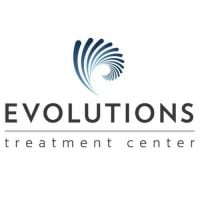Jackson Community Mental Health
Drug Rehab Center in Opa Locka, Florida
Jackson Community Mental Health is an accredited facility located in Florida that offers a range of care services for people with addictions as well as dual diagnosis, including detox, drug rehab and outpatient care, to help those looking to recover from substance abuse and with most private health insurance policies accepted.
About
Jackson Community Mental Health in Opa Locka, Florida is a treatment facility that specializes in addressing alcoholism, opioid addiction, dual diagnosis, drug addiction, mental health issues, and substance abuse. They offer a range of services to assist individuals in their recovery journey. Accredited by both SAMHSA (Substance Abuse and Mental Health Services Administration) and JCAHO (Joint Commission on Accreditation of Healthcare Organizations), Jackson Community Mental Health provides comprehensive care at multiple levels of care. These include detoxification, drug rehabilitation, dual-diagnosis treatment, inpatient care, intensive outpatient programs, outpatient services, and ongoing aftercare support. Their commitment to quality care and recognized certifications make them a reputable choice for those seeking assistance with addiction and mental health challenges.
Jackson Community Mental Health in Opa Locka, Florida offers a wide array of services to address addiction and substance abuse concerns. Their facility provides detoxification services to help individuals safely and comfortably withdraw from drugs and alcohol. They also offer drug rehabilitation programs, focusing on assisting individuals in breaking free from addiction and establishing healthy coping mechanisms. Furthermore, Jackson Community Mental Health provides dual-diagnosis treatment, recognizing the importance of addressing co-occurring mental health disorders alongside addiction. They offer inpatient care for individuals requiring more intensive treatment and support, as well as various levels of outpatient programs for those who can maintain a relatively stable lifestyle while receiving therapy and support. Additionally, they provide aftercare support to help individuals maintain their sobriety and overall well-being after completing their primary treatment.
Genders
Ages
Modality
Additional
Accreditations
SAMHSA

JCAHO
Conditions and Issues Treated
Within the past decade, opioid addiction has become a nationwide epidemic. The United States hosts one of the world’s highest rates of opioid use or abuse and has one of the highest rates of opioid-related deaths. In the United States, opioid drugs are classified as Schedule II-IV controlled substances due to their highly addictive properties and potential for abuse. These include morphine, opium, heroin, oxycodone, hydrocodone, methadone, and fentanyl. Physicians usually prescribe opioids to help control pain.
Over time, opioid users develop a tolerance for the drugs, which makes it difficult, if not impossible, to function without them. In turn, opioid users often resort to illicit means of obtaining the drugs. These means can include drug dealers, friends, and family members who do not have legitimate prescriptions for the drugs. Opioid addiction can quickly lead to heroin use, especially those seeking more intense highs than prescription opioids offer. Due to the high risk of overdose, heroin users are at a much higher risk for illness and death.
A person who struggles with addiction and a mental health condition suffers from a dual diagnosis. This means that they have two issues that must be treated. The specific mental health issues that the patient at Jackson Community Mental Health might have include but are not limited to:
- Depression
- Bipolar Disorder
- Anxiety
- PTSD (Post Traumatic Stress Disorder)
The specific addiction issues that the patient might have include but are not limited to:
- Alcoholism
- Drug Addiction (i.e., Cocaine, Meth, and other stimulants, Marijuana, and Ecstasy)
The combination of the two illnesses can be tough to treat. Taking care of one or the other is tough, and taking care of both cannot be done alone. A patient who receives dual diagnosis treatment will be given the best chance at becoming sober.
Levels of Care Offered
This center offers a variety of custom treatment tailored to individual recovery. Currently available are Detox, Drug Rehab, Dual-Diagnosis, Inpatient, Intensive Outpatient, Outpatient, with additional therapies available as listed below.
Detoxification is a critical first step in treatment for drug addiction. Drug detoxification helps the individual withdraw from the drug by providing a controlled environment where symptoms can be managed through medication and close observation. Detoxification is an inflection point where the individual can get on a recovery track, but it’s also one of the most dangerous points in the recovery process.
In addition to going through physical withdrawal from certain drugs, a detox program also provides the individual with drug testing to monitor their progress. This way, if the individual is not ready for sobriety (such as if they relapse), the treatment professionals can catch it early on and use that opportunity to help re-orient the individual towards recovery.
Inpatient treatment centers offer a safe, secure, and often medically supervised environment for drug or alcohol-addicted individuals. Many of these facilities are equipped to provide detoxification, treatment for co-occurring mental health disorders, and aftercare programs.
The patient typically spends 28 to 30 days at the facility and will receive extensive drug counseling. They will also learn how to live without drugs and how to make the right decisions in life.
Intensive Outpatient Programs are similar to partial hospitalization, but they don’t require the patient to go home each night.
This means that while they have to attend meetings and receive other types of help at the facility, addicts are allowed to keep their jobs or continue with school without having to miss their classes or work opportunities. This is a great option for those who can’t take time away from their jobs or schedules to attend a treatment program.
During this type of program, the addict will be required to meet with counselors and other types of professionals throughout the day. This will help them stay on track and prevent them from relapsing after they leave the facility.
An outpatient treatment program is set up to help with alcohol or drug addiction or a co-occurring disorder. The treatment must attend the treatment facility for their therapy and other programs but return home each night. The frequency of mandatory attendance decreases after much of the treatment program is complete. The treatment programs are monitored by the treatment facility and case managers who work for a judge or judge’s office. A treatment program may be performed out of a treatment facility, treatment clinic, or treatment center.
The benefits of outpatient treatment programs are many. One of the most beneficial treatment programs is that it allows treatment for clients who cannot afford or may not be able to attend treatment at a treatment facility, treatment center, or treatment clinic full-time. Another benefit of treatment programs is that they reduce crime rates because treatment allows people to treat their addiction.
Therapies & Programs
The therapies typically involve all family members, potentially including siblings, children, and parents who play a role in their daily lives. These sessions can be essential because they address past issues that may have affected an addict or alcoholic’s recovery process. They provide support during this time when it is needed most!
A family therapy session, often called a family meeting or intervention, is a necessary process that helps loved ones of addicts see their situation in a new light. It’s also one of the most challenging things families will ever have to do when they’re facing a loved one battling addiction or alcoholism.
Group therapy sessions provide recovering addicts with a chance to cope with everyday situations that many face. Group therapy sessions are held in rehab facilities, clinics, churches or community centers that offer drug addiction treatment.
People who attend these groups are encouraged to voice their feelings and support other addicts in recovery. This helps group members strengthen their own recovery program while cheering on others who are struggling with sobriety.
Trauma therapy allows them to work through past trauma to have peace of mind and begin down the road of sobriety. The therapist will work with the individual to help them understand their past and present relationships. Patients may often believe that something is inherently wrong with them or they are unworthy of love. The therapist aims to correct these negative feelings and behaviors by helping the person realize that their actions do not reflect who they truly are.
Payment Options Accepted
For specific insurance or payment methods please contact us.
Is your insurance accepted?
Ask an expert, call (888) 674-0062
Additional Details
Specifics, location, and helpful extra information.
Opa Locka, Florida 33054 Phone Number(786) 466-2800 Meta DetailsUpdated November 25, 2023
Staff Verified
Patient Reviews
There are no reviews yet. Be the first one to write one.
Opa Locka, Florida Addiction Information
Florida is one of the nation's epicenters for substance abuse and drug-related overdoses. In 2014, around 410,000 Florida residents were addicted to drugs and alcohol. Over the last 10 years, 12% of all deaths in the state were attributed to substance abuse. Treatment admissions for alcohol reached 24,329 patients in 2016, and 2.5% of Florida high school students admitted to using crack cocaine.
8.3% of individuals in Opa-Locka, FL, (between the ages of 12 and 25) had used drugs within a month. The most common drug in Opa-Locka is marijuana, 14% of people in the area have used it within a month. People begin using opioids at 17.9 years old. 7% of those who abuse opioids also abuse heroin. Inpatient and outpatient rehab, 12 step programs, detox, and sober living homes are common treatments.
Treatment in Nearby Cities
- Saint Cloud, FL (173.9 mi.)
- Perrine, FL (22.7 mi.)
- Madeira Beach, FL (204.6 mi.)
- Citra, FL (267.8 mi.)
- De Bary, FL (215.3 mi.)
Centers near Jackson Community Mental Health
The facility name, logo and brand are the property and registered trademarks of Jackson Community Mental Health, and are being used for identification and informational purposes only. Use of these names, logos and brands shall not imply endorsement. RehabNow.org is not affiliated with or sponsored by Jackson Community Mental Health.



